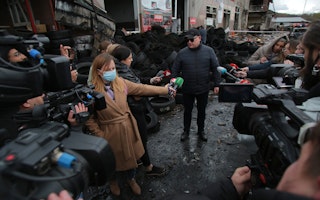Transparency Can Alleviate Poverty
By George Soros
The following editorial originally appeared in the Financial Times. George Soros is founder and chair of the Open Society Institute.
Countries that are rich in natural resources are often poor because exploiting those resources takes precedence over good government. Competing oil and mining companies, backed by their governments, have often been willing to deal with anyone who could assure them of a concession. This has bred corrupt and repressive governments and armed conflict. In Africa, civil wars have devastated resource-rich countries such as Congo, Angola and Sudan. In the Middle East, democracy has failed to materialize. Lifting this resource curse could make a large contribution to alleviating poverty and misery in the world, and there is an international movement aimed at doing just that. The first step is transparency; the second is accountability.
The movement started a few years ago with the Publish What You Pay campaign, which urged oil and mining companies to disclose payments to governments. In response, the British government launched the Extractive Industries Transparency Initiative (EITI). Today, three years into the process, the UK will convene an important EITI conference in London, to be attended by representatives of governments, business and civil society.
Much has been accomplished. International extractive companies are starting to acknowledge the value and necessity of greater transparency. BP has agreed to disclose disaggregated payment information on its operations in Azerbaijan, and Royal Dutch/Shell is doing the same in Nigeria. ChevronTexaco recently negotiated an agreement with Nigeria and Sao Tome and Principe that requires publication of company payments in the joint production zone. Investors representing nearly $7.0bn (Pounds 3,650bn, Euros 5,250bn) in capital have endorsed EITI and called on companies to be more transparent in the reporting of payments.
But the most encouraging sign comes from the producing countries themselves. Nigeria is reorganizing its state oil company, introducing transparency legislation, and launching sweeping audits of the oil and gas sector. It plans to begin publishing details of company payments to the state this summer.
The Kyrgyz Republic became the first country to report under EITI, for a large gold mining project. Azerbaijan will report oil revenues later this month. Ghana and Trinidad and Tobago have also signed up. Peru, Sao Tome and Principe, and East Timor are in negotiations to implement the initiative. Equally important, local activists are starting to use EITI as way of demanding greater accountability for government spending. My own foundation, the Open Society Institute, has established Revenue Watch programs in producing countries.
But there is a lot more to be done. Two-thirds of the world's most impoverished people live in about 60 developing countries or countries in transition to the free market that depend on oil, mining, or gas revenues. The recently published transparency index from Save the Children UK, the charity, shows that transparency is the exception, not the rule. Many important producing countries have yet to make even a gesture towards disclosure. Angola, Bolivia, Mongolia, Kazakhstan, Chad, Mauritania, and Gabon are among the countries outside EITI that need to be brought in. There is no reason why big Middle Eastern producers and Indonesia should not join this transparency push and embrace the EITI. It is also critical that state-owned companies, which account for the bulk of global oil and gas production, be subject to full disclosure.
Other governments need to follow the UK and help expand the EITI. France appears to have done little to encourage countries within its sphere of influence, let alone ask its own companies to disclose information. The Bush administration's recent decision to initiate a parallel anti-corruption process through the Group of Eight leading industrial nations leaves the US outside the leading international forum for addressing resource revenue transparency and reinvents the wheel.
The US and Britain have not used their power in Iraq to promote transparency in the oil sector. Let us hope the new Iraqi government does better. It is difficult to see how democracy can take root if the country's most important source of income remains as veiled in secrecy as it was under Saddam.
The EITI is one of the most effective vehicles available for achieving a global standard of disclosure and accountability. This week's summit is an opportunity to define more precisely what it means to implement the EITI by establishing some basic minimum requirements for host countries.
Those committed to seeing the wealth generated by energy and mining finally improve the lives of ordinary people would do well to invest in the initiative at this critical stage. In concert with efforts such as Publish What You Pay, EITI promises to do a lot of good in the world.
George Soros is founder and chair of the Open Society Foundations.


